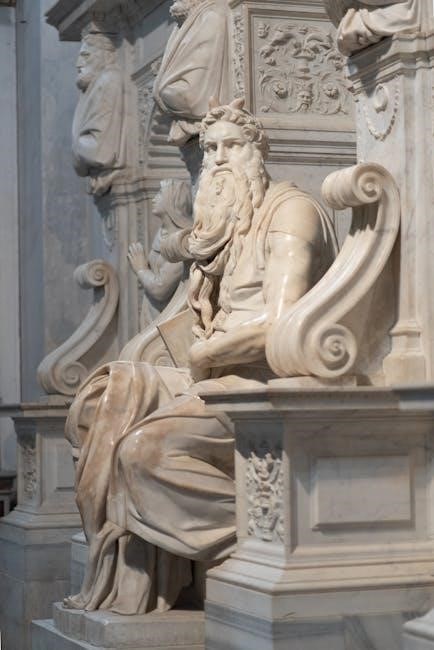moses and monotheism pdf
Sigmund Freud’s final work‚ Moses and Monotheism‚ published in 1939‚ explores the origins of monotheism and Moses’ role in shaping Jewish identity through psychoanalytic insight.
1.1 Overview of the Book
Moses and Monotheism‚ Freud’s final work‚ explores the origins of monotheism and Moses’ role in shaping Jewish identity through psychoanalytic insight. Published in 1939‚ it examines the formation of monotheistic beliefs and their impact on cultural development. Freud argues that Moses‚ as a central figure‚ introduced a radical shift from polytheism to monotheism‚ influencing Jewish identity profoundly. The book delves into the psychological and anthropological underpinnings of religious belief‚ linking Moses’ leadership to the emergence of a unified‚ ethical worldview. Freud’s controversial theories suggest that the rejection and eventual murder of Moses by the Israelites led to unconscious guilt‚ shaping Jewish history. This work remains a provocative analysis of religion‚ culture‚ and psychology.
1;2 Historical Context and Significance
Moses and Monotheism was written during a tumultuous period in history‚ with the rise of Nazism and escalating anti-Semitism. Freud‚ a Jewish intellectual‚ explored the origins of monotheism and its cultural significance‚ arguing that Moses’ leadership and the adoption of monotheistic beliefs defined Jewish identity. The book‚ published in 1939‚ reflects Freud’s concerns about the survival of Jewish traditions amidst persecution. His controversial thesis—that the Israelites murdered Moses and later repressed this act—ties into his broader psychological theories about guilt‚ repression‚ and the formation of religious beliefs. This work remains a provocative and deeply personal exploration of religion‚ history‚ and identity‚ challenging traditional narratives about Judaism’s origins.

Freud’s Thesis on Moses and Monotheism
Freud argued that Moses‚ an Egyptian noble‚ introduced monotheism to the Israelites‚ shaping their identity. His murder by the people led to collective guilt and repression.
2.1 The Role of Moses in Judaism
Moses is central to Judaism as a prophet‚ lawgiver‚ and leader who freed the Israelites from Egyptian bondage. He received the Torah‚ embodying divine laws‚ on Mount Sinai‚ establishing monotheistic beliefs. Freud’s analysis highlights Moses as the founder of the Jewish people‚ attributing their resilience and identity to his leadership and teachings. Moses’ role transcends religion‚ influencing legal and ethical frameworks‚ while his legacy endures as a unifying figure in Jewish tradition and history‚ shaping cultural and religious practices for millennia.
2.2 Freud’s Psychological Interpretation of Moses
Freud’s psychoanalytic interpretation of Moses explores his role as a cultural and religious leader through psychological mechanisms. Freud posits that Moses‚ an Egyptian noble‚ introduced monotheism to the Hebrews‚ transforming their identity. He suggests that Moses’ eventual murder by the Israelites led to unconscious guilt‚ shaping Jewish history and identity. Freud links this trauma to the development of monotheistic beliefs and ethical strictures‚ viewing Moses as a symbolic father figure whose legacy oscillates between reverence and rebellion. This psychological framework underscores Freud’s belief that religious and cultural traditions arise from repressed collective memories and unresolved conflicts.

The Concept of Monotheism
Monotheism‚ the belief in one all-powerful God‚ was introduced by Moses‚ shaping Jewish identity and ethics‚ as Freud explores its psychological and cultural significance.
3.1 Definition and Evolution of Monotheism
Monotheism is defined as the belief in a single‚ omnipotent deity. Originating with Moses‚ it evolved from earlier polytheistic practices‚ emphasizing ethical monotheism. Freud highlights its psychological roots in primal guilt‚ linking it to the societal need for moral structure. The shift from multiple gods to one unified deity marked a significant cultural leap‚ influencing Jewish identity and later Christianity. Freud’s analysis ties this evolution to psychological dynamics‚ suggesting that monotheism arose from a collective unconscious seeking order and redemption. This concept remains central to understanding religious and cultural development‚ as explored in Moses and Monotheism.
3.2 The Impact of Monotheism on Jewish Identity
Monotheism became the cornerstone of Jewish identity‚ shaping a distinct ethical and religious framework. Freud argues that the belief in one God fostered a sense of chosenness and moral responsibility. This belief system‚ rooted in the covenant between God and the Jewish people‚ created a unique collective identity. The adherence to monotheistic principles‚ as outlined in the Torah‚ provided a unifying force for the Jewish community. Freud further suggests that this identity was deeply tied to the psychological and cultural legacy of Moses‚ emphasizing resilience and a shared moral code. Thus‚ monotheism not only defined Jewish theology but also shaped its enduring cultural and historical trajectory.

The Torah and Moses’ Leadership
Moses‚ as a prophet and lawgiver‚ received the Torah from God‚ establishing a moral and legal framework for the Jewish people. His leadership shaped Jewish tradition and identity‚ emphasizing divine authority and ethical guidelines that endure. Freud’s analysis highlights Moses’ role in transmitting these teachings‚ which became central to monotheistic beliefs and practices. The Torah’s revelation to Moses marked the foundation of Jewish religious and cultural life‚ reflecting Freud’s view of Moses as a unifying figure. His leadership and the Torah’s teachings remain pivotal in Jewish history and identity‚ influencing Freud’s psychoanalytic interpretations of religious origins and societal structures.
4.1 Moses as a Prophet and Lawgiver
Moses is depicted as a central figure in Judaism‚ serving as both a prophet and a lawgiver. He is credited with receiving the Torah from God‚ which established the moral and legal framework for the Jewish people. Freud’s analysis emphasizes Moses’ role in creating the Jews as a unified nation‚ highlighting his leadership and the divine authority he represented. The Torah‚ as revealed to Moses‚ became the cornerstone of Jewish identity‚ shaping religious practices and ethical guidelines. Freud’s interpretation underscores Moses’ influence in fostering monotheistic beliefs‚ which he viewed as a significant step in human psychological and cultural development. This portrayal of Moses reflects Freud’s interest in the interplay between religious leadership and societal transformation.
4.2 The Torah’s Role in Shaping Monotheistic Beliefs
The Torah‚ as the foundational text of Judaism‚ played a pivotal role in establishing monotheistic beliefs. It outlined the principles of worshipping one God and adhering to divine laws‚ which Freud interpreted as a cornerstone of Jewish identity. The Torah’s emphasis on ethical conduct and moral responsibility reinforced the idea of a universal‚ omnipotent deity. Freud viewed the Torah as a cultural and psychological milestone‚ fostering a collective sense of purpose and unity among the Jewish people. Its teachings not only shaped religious practices but also influenced the development of monotheism as a concept‚ making it central to Jewish tradition and Freud’s analysis of its historical significance.

Psychological and Anthropological Insights
Freud’s psychoanalytic approach in Moses and Monotheism explores the psychological roots of religious belief‚ linking Moses’ story to collective guilt and the rise of monotheism.

5.1 Freud’s Psychoanalytic Approach to Religion
Freud’s psychoanalytic approach to religion in Moses and Monotheism posits that religious beliefs stem from unconscious psychological conflicts and repressed desires. He argues that religion functions as a collective neurosis‚ arising from humanity’s unresolved Oedipal conflicts and the need for a paternal figure. Freud interprets monotheism as a manifestation of this psychological dynamic‚ with God representing an idealized father figure. He suggests that the origins of religion are deeply tied to guilt and trauma‚ particularly the hypothetical murder of Moses‚ which he believes instilled a lasting sense of unconscious guilt in the Jewish people. This guilt‚ Freud argues‚ became the psychological foundation of monotheistic beliefs and practices.

5.2 The Unconscious Guilt and Moses’ Fate
Freud’s theory in Moses and Monotheism suggests that the Jewish people harbored unconscious guilt stemming from the hypothetical murder of Moses. He proposed that Moses‚ an Egyptian noble‚ introduced monotheism to the Hebrews but was eventually killed by them. This act of patricide‚ Freud argued‚ left a lasting psychological scar‚ manifesting as collective guilt. The repressed memory of this event became central to Jewish identity‚ shaping their religious and ethical systems. Freud believed this guilt drove the development of monotheistic beliefs and the adherence to Moses’ teachings‚ despite his physical absence. This psychological trauma‚ he contended‚ was a cornerstone of Jewish spirituality and cultural resilience.

The Legacy of “Moses and Monotheism”
Freud’s Moses and Monotheism remains a controversial yet influential work‚ shaping modern thought on religion‚ psychology‚ and cultural identity‚ despite criticism of its speculative historical claims;
6.1 Academic Reception and Criticism

Moses and Monotheism has sparked intense debate since its publication. Scholars criticize Freud’s speculative historical claims and lack of archaeological evidence‚ questioning the accuracy of his Moses biography. Some view the work as a blend of psychology and mythology rather than a historical analysis. Despite this‚ Freud’s exploration of monotheism’s psychological roots has influenced cultural and religious studies. Critics argue that Freud’s theories about the murder of Moses and collective guilt are unprovable‚ yet they acknowledge the book’s value as a psychoanalytic interpretation of religious origins. The work remains controversial but significant‚ challenging traditional views of Judaism and monotheism’s development.

6.2 The Book’s Influence on Modern Thought
Moses and Monotheism has profoundly influenced modern thought‚ particularly in cultural and religious studies. Freud’s psychoanalytic lens on monotheism and Moses’ role has inspired new perspectives on the origins of religion and group identity. The book’s exploration of collective guilt and the psychological roots of religious belief has resonated in philosophy‚ literature‚ and anthropology. Its controversial ideas have sparked debates about the nature of leadership‚ cultural memory‚ and the formation of societal norms. While criticized for its historical speculation‚ the work remains a pivotal text in understanding the interplay between psychology and religion‚ shaping interdisciplinary approaches to studying human culture and belief systems.
